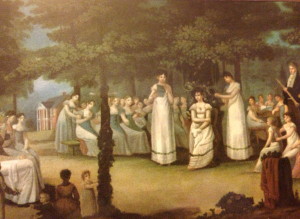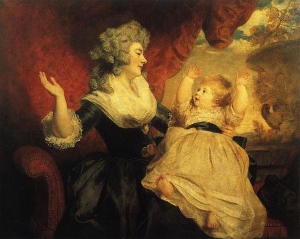Happy Labor Day, everyone!
 In Virginia, Labor Day is, by law, the day before school starts, so it seems fitting for me to discuss education, specifically the education of a Regency young lady.
In Virginia, Labor Day is, by law, the day before school starts, so it seems fitting for me to discuss education, specifically the education of a Regency young lady.
Our heroes all have attended Eton or Harrow and on to Oxford or Cambridge, but what of our heroines? There really wasn’t parallel educational paths for women during the Regency. Daughters of the aristocracy were typically educated at home by governesses, like Jane Austen’s Emma, supplemented by music masters, drawing masters and dance masters, of course.
There were boarding schools, many of them in Bath. The better ones catered to the daughters of the ton, but daughters of gentry might attend such schools as well. Not all of these schools gave what we would consider a quality education. Later than the Regency (1840), Dorothea Beale describes:
…what miserable teaching we had in many subjects; history was learned by committing to memory little manuals; rules of arithmetic were taught, but the principles were never explained. Instead of reading and learning the masterpieces of literature, we repeated week by week the ‘Lamentations of King Hezekiah’, the pretty but somewhat weak ‘Mother’s Picture’.
Being truly educated, a bluestocking, was not a desirable condition for a lady, though. Young ladies were expected to be accomplished, not educated. In Pride and Prejudice, Caroline Bingley gives us a list (Austen’s) of what this means:
A woman must have a thorough knowledge of music, singing, drawing, dancing, and the modern languages, to deserve the word. Mr. Darcy adds, To all this she must yet add something more substantial, in the improvement of her mind by extensive reading.
They leave out needlework, both decorative and practical, another important component of a young lady’s education, as was letter-writing. Young ladies also learned French and Italian. In an ironic way, a young lady’s education could be more varied than a Regency gentleman’s. A Regency boy was expected to learn Latin and Greek and was confined to a Classical education. A young lady could read and study anything she liked. Jane Austen had the run of her father’s library. She never mentions Classical Literature in her books.
Has school started in your area yet? What are you doing for Labor Day?

